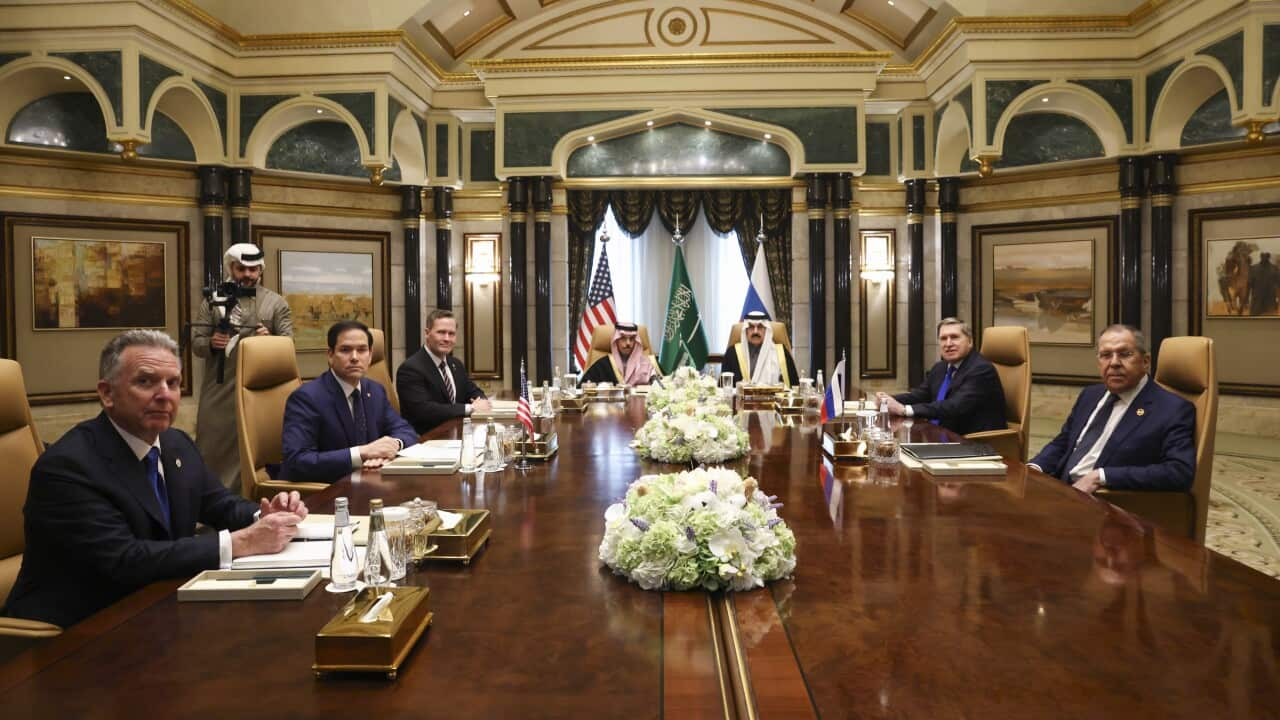The Trump administration announced on Tuesday it would hold more talks with Russia on ending the war in Ukraine after an initial meeting that excluded Ukraine, marking a shift from its previous approach that rallied US allies to isolate Russian President Vladimir Putin.
As the four-and-a-half-hour meeting in the Saudi capital was underway, Russia hardened its demands, notably insisting it would not tolerate NATO granting membership to Ukraine.
It was the first time US and Russian officials have sat down together to discuss ways to halt the deadliest conflict in Europe since World War Two.
Ukraine has said it will not accept any deal imposed without its consent, and German Chancellor Olaf Scholz reiterated “there must be no decision over the heads of Ukraine”.
Even before the talks, some European politicians accused Trump’s administration of handing free concessions to Russia last week by ruling out NATO membership for Ukraine, saying it was an illusion for Ukraine to believe it could win back the 20 per cent of its territory under Russian control.
US national security adviser Mike Waltz told reporters in Riyadh the war must come to a permanent end, and this would involve negotiations over territory.
“Just a practical reality is that there is going to be some discussion of territory and there’s going to be discussion of security guarantees,” he said.
Addressing Ukrainian and European concerns, US secretary of state Marco Rubio said no-one was being sidelined, the European Union needed to be involved at some point, and any solution must be acceptable to all parties.
Ukrainian President Volodymyr Zelenskyy said he had postponed a visit to Saudi Arabia planned for Wednesday until next month. Sources familiar with the matter said the decision was made to avoid giving “legitimacy” to the US-Russia talks.
Ukraine says talks on how to end the war should not be held behind it’s back.
Russian foreign ministry spokesperson Maria Zakharova told reporters in Moscow it was “not enough” for NATO not to admit Ukraine as a member.
She said the alliance must go further by renouncing the promise made at the 2008 Bucharest summit that Ukraine would join NATO at an unspecified future date.
“Otherwise, this problem will continue to poison the atmosphere on the European continent,” she said.
Zelenskyy has consistently demanded NATO membership as the only way to guarantee Ukraine’s sovereignty and independence from its nuclear-armed neighbour.
Ukraine agreed to give up its Soviet-era nuclear weapons in 1994 in exchange for assurances of independence and sovereignty within its existing borders from Russia, the US and Britain.
NATO troops in Ukraine ‘unacceptable’
As European countries discuss the possibility of contributing peacekeepers to back any Ukraine peace deal, Russian foreign minister Sergei Lavrov said in Riyadh that Russia would not accept deployment of NATO troops there, whatever flag they were operating under.
“Of course, this is unacceptable to us,” he said.
The comments by Lavrov and Zakharova signalled Russia will keep pressing for further concessions in the negotiations.
The opening encounter on Tuesday brought together Lavrov and Putin foreign policy adviser Yuri Ushakov — two veterans with a combined 34 years in their current roles — who negotiated with three Trump administration officials, all still in their first month on the job.
Russia did not mention offering any concessions, and US officials did not claim to have scored any in Tuesday’s meeting, leading observers to doubt whether the talks would turn into serious peace negotiations.
US and Russian teams would work on restoring the countries’ respective diplomatic missions in Washington and Moscow to ease the talks going forward, Rubio said.
Both sides said no date had been set for a meeting between Trump and Putin, which both men say they want.
But the fast-moving diplomacy, beginning with a Putin-Trump phone call only six days ago, has triggered alarm in Ukraine and European capitals that the two leaders could cut a quick deal that ignores their security interests and leaves Putin free to threaten Ukraine or other countries in the future.
Jana Puglierin, senior policy fellow at the European Council on Foreign Relations, said February 2022, the month of Russia’s full-scale invasion of Ukraine, showed Europeans they could not depend on Russia, but developments this month were a more significant turning point.
“February 2025 shows us that the Americans no longer feel responsible for European security — and that their interests are fundamentally different from ours,” she said.
Lavrov said there was “high interest” in lifting economic barriers between the two countries after the US and other Western countries imposed waves of sanctions on Russia over the war, seeking to isolate Putin.
Rubio was non-committal when asked whether these might be lifted.
“There are other parties that have sanctions. The European Union is going to have to be at the table at some point, because they have sanctions as well that have been imposed.”
